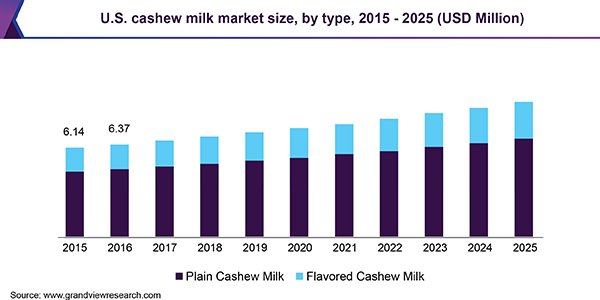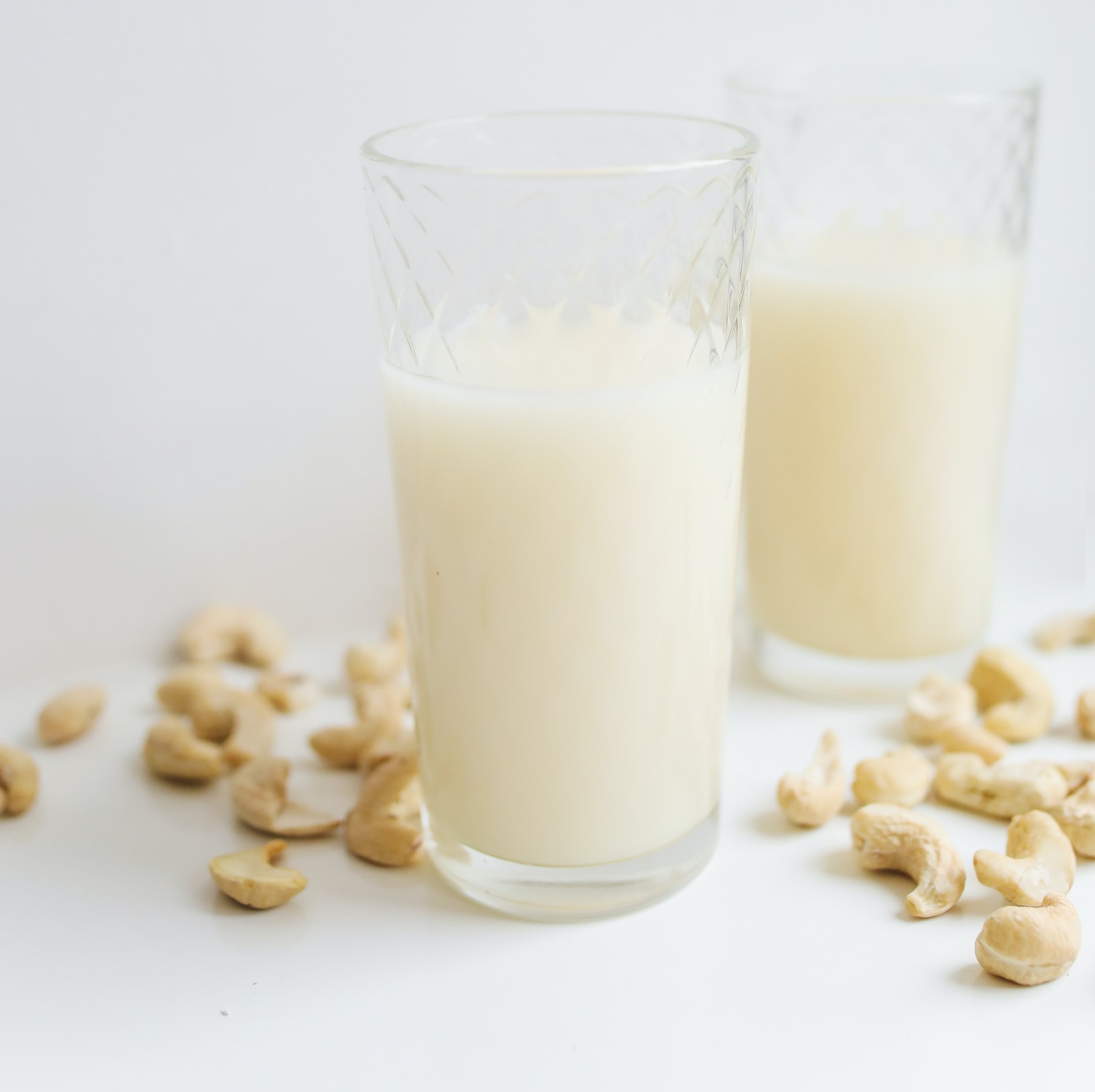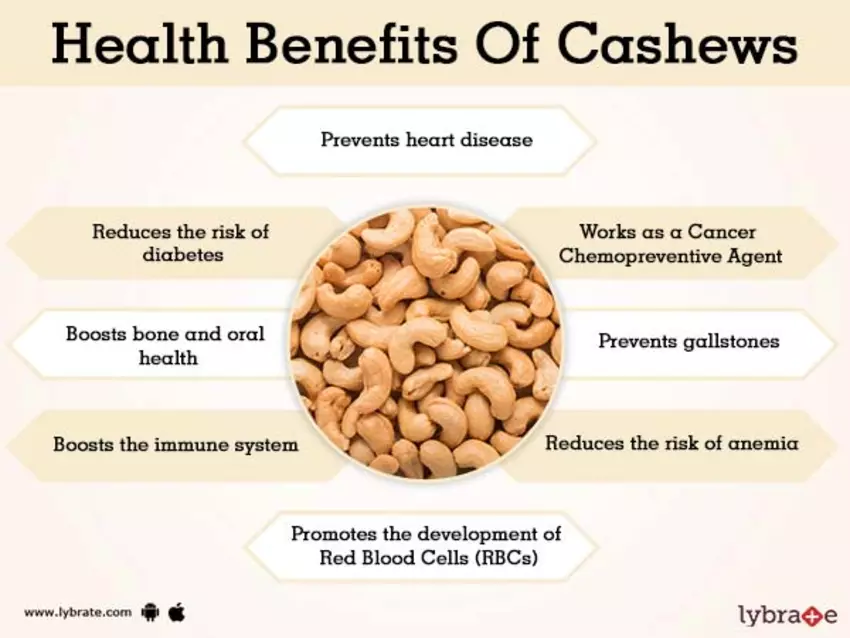|
|
The cashew milk market touched USD 37.8 million in 2020 and is projected to hit an compound annual growth rate (CAGR) of 5.0% from 2020 to 2027.
Mounting awareness of the host of benefits associated with cashew milk, including boosted heart health, prevention of iron deficiency, controlled blood sugar, better eye health, and skin health, will only enhance its demand.
In this article, we’ll explore how cashew milk is grown, its health benefits, and emerging market trends. Let’s find out if it’s healthier than almond milk.
Dig deeper → 3 min
Introduction to Cashew Milk
Cashew milk is one of the most consumed non-dairy beverages in the world, made entirely from whole cashews and water. It has a rich, creamy consistency and contains a high level of healthy fats, minerals, vitamins, and several beneficial plant compounds.
Available in sweetened and unsweetened varieties, it serves as an excellent substitute for cow’s milk in many recipes. It helps bolster immunity while improving eye, skin, and heart health.
Consumers all over the world are exploring plant-based products like cashew milk. The preparation of this low-calorie plant-based milk is very simple. It is creamy and sweet, standing as an ideal dairy-free alternative.
It is rich in beneficial minerals, fatty acids, plant sterols, and vitamins and lactose intolerant individuals can drink plant milks without negative side effects.
Cashew milk is a perfect alternative to buffalo or cow, especially among vegans and those with lactose intolerance. The unsweetened version of cashew milk has greater degrees of calcium and vitamin A than cow milk.
With fewer sugars and calories, it makes for a savory bakery product, you can use to prepare coffee and tea. Cashew milk’s nutritional content and taste vary slightly based on the brands.
It is available in both sweetened and unsweetened forms. It is also fortified with vitamins E, A, & D2, calcium carbonate, natural flavor, lecithin, and salt, in a few cases.
Understanding the Nutritional Aspects of Cashew Milk
Protein
The protein content in cashew milk varies based on the brand. A few brands may offer 1 gram per 8-ounce serving, while others provide up to 6 grams.
Carbs
Cashews have some carbohydrates that are in the form of fiber and starch. Additionally, brands with a green signal from the USDA make use of date sugar for sweetening the beverage, which is where the carbohydrates come from.
When nuts soak in water to prepare cashew milk, some of the cashews’ starches are absorb into the final product.
Now, focusing on the carbs from sugar, the commercially prepared cashew milk uses various amounts of sweetener. Added sugar adds to the carb content; therefore, it is a good idea to check the nutrition labels and ingredient lists for those wanting to lose weight.
Fats
Most brands offer cashew milk with nearly 11 grams of fat per serving, which may sound like a nightmare for weight watchers. However, there is good news for them: most of the fat in cashews is monounsaturated and healthy. Monounsaturated, plant-based fats offer many benefits, including a lower risk of heart disease.
Calories
One serving offers nearly 158 calories. The total count of calories varies per brand; therefore, the consumers are always to advised to check the bottle’s nutrition label.
Vitamins and Minerals
Commercially developed cashew milk has both added and naturally occurring vitamins and minerals. Various brands fortify plant milks with iron, vitamins E and D, and calcium. It is also a great source of sodium, at around 5% of the daily value per 8 ounces.
What are the Notable Health Benefits of Cashew Milk?
Popularly known for being a creamy, healthier version of dairy milk, cashew milk offers many health benefits.
Builds Strong Bones
Cashew milk, when fortified, can offer up to 40% of the everyday value of calcium. This crucial mineral facilitates strong bones and promotes nerve and muscle function.
A Remarkable Dairy Alternative for Vegans
Vegans everywhere can enjoy this plant-based beverage since it has no animal essence. However, one should remember that it can’t be used as a complete substitute for cow’s milk in micronutrients and protein.
Better Heart Health
Cashew milk contains fats that add satiation and flavor, but these fats are mostly known for fostering heart health. Studies have established a strong link between the intake of monounsaturated, plant-based fats and the prevention of cardiovascular disease.
Allergy-Friendly
For those dealing with a dairy allergy or lactose intolerance and who have to nix cow’s milk from their diet, cashew milk can be used to add a dairy-like texture to their meals. With no casein, whey, or lactose, it doesn’t lead to gastrointestinal issues for people with poor dairy digestion capacity.
Enhanced Eye Health
Cashews, particularly in raw form, contain antioxidants like zeaxanthin and lutein. The American Optometric Association says these antioxidants reduce the chances of chronic eye diseases, mostly cataracts and age-related macular degeneration.
Facilitate Weight Reduction
Cashew milk has anacardic acid, a bioactive compound that, during adipogenesis, helps curb fat accumulation. This allows the consumer to maintain their weight, even reduce some. Cashew milk has lower calorie content than cow’s milk and almond milk. Therefore, it could be the best substitute for those working on losing a few pounds.
Prevention of Gallstones
Cashews prevent the development of gallstones while reducing the risk of diabetes. A study was conducted based on the dietary data collected for more than 20 years on 90,000 women.
The results showed that those who consumed one ounce of cashew nuts a week had a whopping 30% lower chance of developing gallstones. This means that including this type of plant milk in the diet can prevent the development of gallbladder disease.
Plant Milk Market Today and Growth Prospects

Numerous drivers, including the heightened preference for plant-based foods, contribute significantly to the market growth. Likewise, since cashew milk is majorly publicized as a healthy, plant-based beverage containing high levels of calcium, low sugar, and low fat, it has grabbed the attention of many consumers worldwide.
Heightened cholesterol levels claim lives, and the surging number of patients dealing with this condition has highlighted the importance of low-fat milk like cashew milk. Those dealing with deficiencies in vitamin B12 and B2 are progressively opting for this type of milk.
Another major trend emerging in the plant milk industry is the soaring demand for frozen desserts. Stakeholders in the market are working on expanding their portfolios in non-dairy products like cashew milk, coconut milk, and almond milk-based frozen desserts. All these factors are slated to have a favorable impact on the plant milk market in the years to come.














No Comments